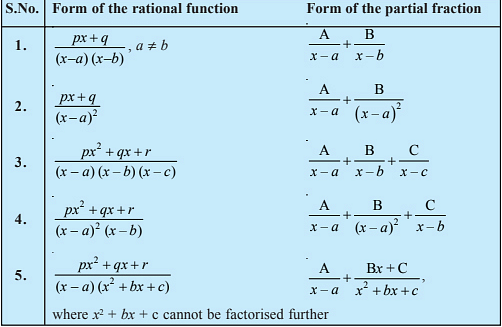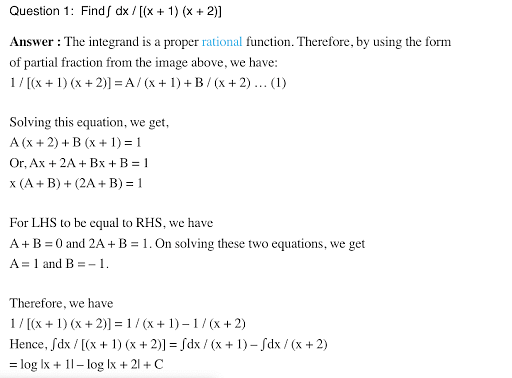Question:
Integrate the function: \(x(logx)^2\)
Integrate the function: \(x(logx)^2\)
Updated On: Oct 4, 2023
Hide Solution
Verified By Collegedunia
Solution and Explanation
The correct answer is: \(\frac{x^2}{2}(logx)^2-\frac{x^2}{2}logx+\frac{x^2}{4}+C\)
Let \(I=∫x(logx)^2 dx\)
Taking\((logx)^2\) as first function and 1 as second function and integrating by parts,we
obtain
\(I=(logx)^2∫x.dx-∫[{\frac{d}{dx}logx)^2}∫x dx]dx\)
\(=\frac{x^2}{2}(logx)^2-[∫2logx.\frac{1}{x}.\frac{x^2}{2}.dx]\)
\(=\frac{x^2}{2}(logx)^2-∫xlogx. dx\)
Again integrating by parts,we obtain
\(I=\frac{x^2}{2}(logx)^2-[logx∫x dx-∫[{(\frac{d}{dx}logx)∫x dx}]dx]\)
\(=\frac{x^2}{2}(logx)^2-[\frac{x^2}{2}-logx-∫\frac{1}{x}.\frac{x^2}{2}dx]\)
\(=\frac{x^2}{2}(logx)^2-\frac{x^2}{2}logx+\frac{1}{2}∫x dx\)
\(=\frac{x^2}{2}(logx)^2-\frac{x^2}{2}logx+\frac{x^2}{4}+C\)
Let \(I=∫x(logx)^2 dx\)
Taking\((logx)^2\) as first function and 1 as second function and integrating by parts,we
obtain
\(I=(logx)^2∫x.dx-∫[{\frac{d}{dx}logx)^2}∫x dx]dx\)
\(=\frac{x^2}{2}(logx)^2-[∫2logx.\frac{1}{x}.\frac{x^2}{2}.dx]\)
\(=\frac{x^2}{2}(logx)^2-∫xlogx. dx\)
Again integrating by parts,we obtain
\(I=\frac{x^2}{2}(logx)^2-[logx∫x dx-∫[{(\frac{d}{dx}logx)∫x dx}]dx]\)
\(=\frac{x^2}{2}(logx)^2-[\frac{x^2}{2}-logx-∫\frac{1}{x}.\frac{x^2}{2}dx]\)
\(=\frac{x^2}{2}(logx)^2-\frac{x^2}{2}logx+\frac{1}{2}∫x dx\)
\(=\frac{x^2}{2}(logx)^2-\frac{x^2}{2}logx+\frac{x^2}{4}+C\)
Was this answer helpful?
0
0
Top Questions on integral
Let \( f : (0, \infty) \to \mathbb{R} \) be a twice differentiable function. If for some \( a \neq 0 \), } \[ \int_0^a f(x) \, dx = f(a), \quad f(1) = 1, \quad f(16) = \frac{1}{8}, \quad \text{then } 16 - f^{-1}\left( \frac{1}{16} \right) \text{ is equal to:}\]
- Let $ f(x) $ be a positive function and $I_1 = \int_{-\frac{1}{2}}^1 2x \, f\left(2x(1-2x)\right) dx$ and $I_2 = \int_{-1}^2 f\left(x(1-x)\right) dx.$ Then the value of $\frac{I_2}{I_1}$ is equal to ____
- Evaluate the integral: \[ \int \frac{x^2 + 2x}{\sqrt{x^2 + 1}} \, dx \]
- Evaluate the integral: \[ \int \sqrt{x^2 + 3x} \, dx \]
- The value of the integral \( \int_0^1 x^2 \, dx \) is:
View More Questions
Questions Asked in CBSE CLASS XII exam
- What happens when acidic solution of potassium permanganate is allowed to stand for sometime ? Give the equation involved. What is this type of reaction called ?
- CBSE CLASS XII - 2026
- d -and f -Block Elements
- Why Cr has higher melting point than Mn ?
- CBSE CLASS XII - 2026
- d -and f -Block Elements
- Why transition metals act as good catalyst ?
- CBSE CLASS XII - 2026
- d -and f -Block Elements
- Name a member of the lanthanoid series
(I) which exhibits +4 oxidation state
(II) which exhibits +2 oxidation state.
- CBSE CLASS XII - 2026
- d -and f -Block Elements
- Write the ionic equations for the oxidising action of potassium permanganate for its reaction with \(I^-\) in both acidic and alkaline solutions.
- CBSE CLASS XII - 2026
- d -and f -Block Elements
View More Questions
Concepts Used:
Integration by Partial Fractions
The number of formulas used to decompose the given improper rational functions is given below. By using the given expressions, we can quickly write the integrand as a sum of proper rational functions.

For examples,
